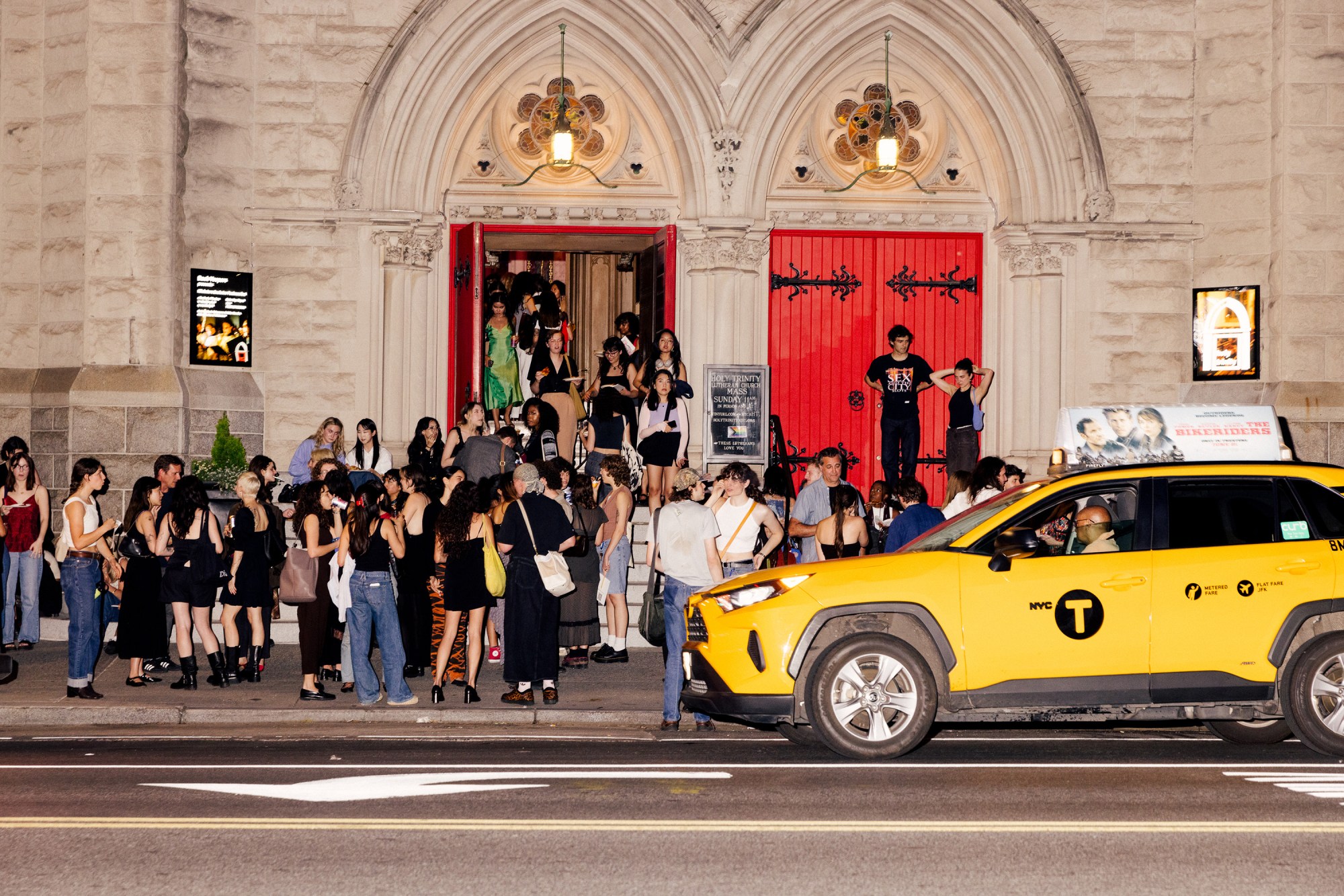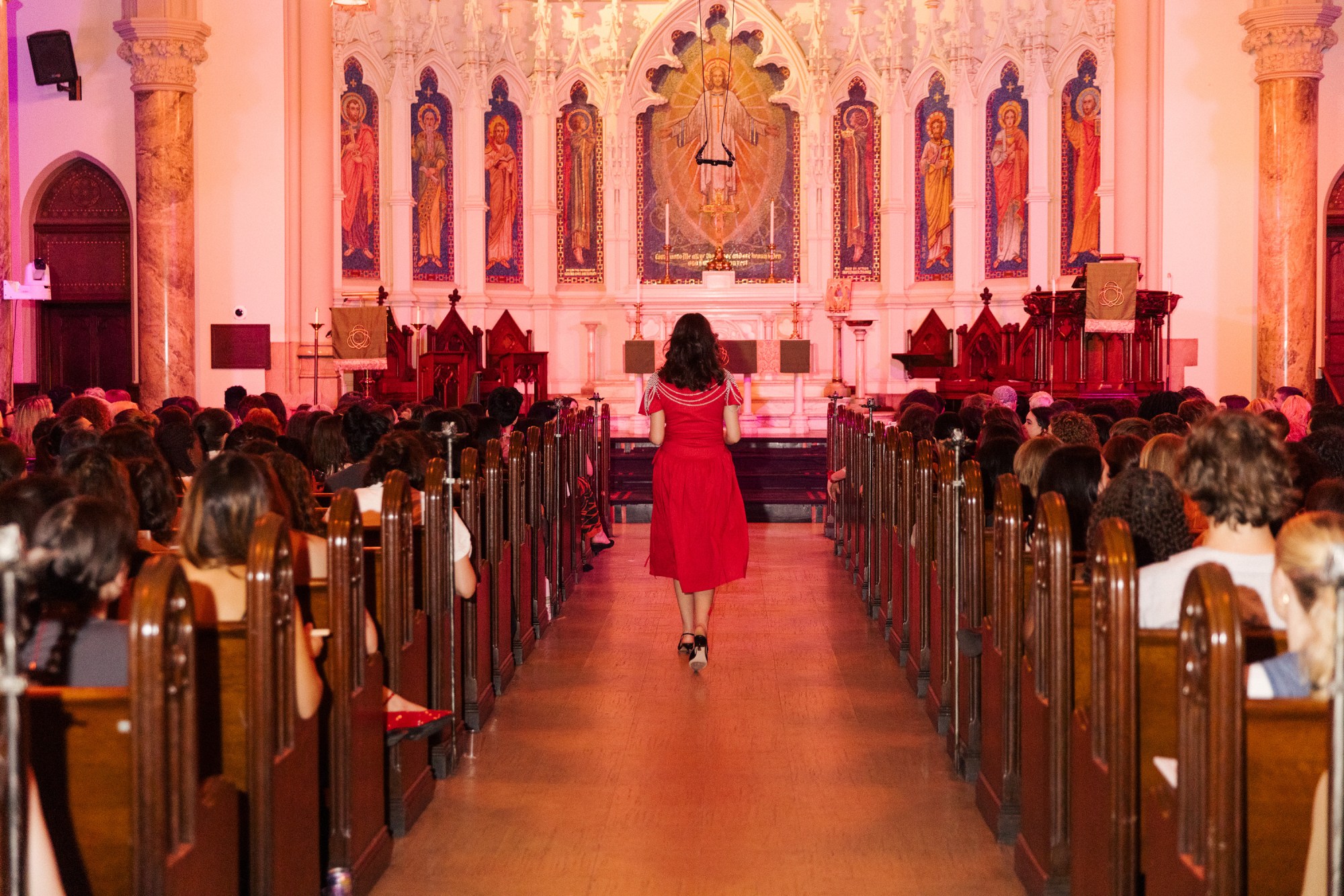In June of this year, Rayne Fisher-Quann, the writer behind the wildly popular Substack “Internet Princess”, organised a reading in the Holy Trinity Lutheran Church on Manhattan’s Upper West Side, a Gothic-style building known for its dramatic copper spire. This was not your average reading. Rayne, gleaming in borrowed chainmail, gathered a group of writers not just to share their work, but to spill their guts.
For the event, titled Secrets Reading, all of the participants (musician Eliza McLamb, novelist Marlowe Granados, author Emmeline Clein, TikTok diarist Mackenzie Thomas, and journalists and critics P.E. Moskowitz and Terry Nguyen) wrote pieces that revealed a closely guarded secret. But there was a twist: each performer read another’s secret, so no one in the audience, or even among the group themselves, knew whose secret belonged to whom – except for Rayne. “It was a power trip,” she says with a laugh. “Really I shouldn’t have known, but I couldn’t resist.”
Once generally reserved for the serious and literary (and unfortunate participants in coffee shop open mics), readings have become, post-2020, a certified trend. Writers, the most isolated members of the creative class, wanted to get out of the house and interact, and also have their photo taken. So in the last few years, readings have exploded, taking over smoky townhouses and rooftops and parking lots and “spaces” and countless galleries. There is usually an afterparty.
But even in this more celebratory era of readings, the Secrets Reading stood out as an unusually grand affair. Tickets sold out just four minutes after the event was announced, and the audience packed into the church’s wooden pews, backlit from glowing stained glass. In a ceremonial touch, each writer strode towards Holy Trinity Lutheran’s altar, framed by ornate mosaics. The organist played Madonna’s “Material Girl” as Marlowe walked down the aisle.
The secrets were not published on any other platforms. “My work is so online, and while it often can feel so personal, the connection with the audience can sometimes feel intangible,” Rayne says. “What I wanted to do with this reading was to create an experience that literally could not be replicated on the internet. The whole point of the readings was their ephemerality, that nothing that was read was going to be posted. The only way to see it was to be there in the room. I think that’s part of why it was so successful.”
It makes sense that Rayne, who just turned 23, would crave an experience in corporeal form. She grew up on the internet, where her work took off (93,000 subscribers and counting), and she has become a rightfully lauded chronicler of culture and How We Live Now. Her work, perceptive and sweet, tackles subjects ranging from Internet ephemera like West Elm Caleb to the epidemics of numbness, overconsumption and isolation that plague Gen Z. So-called difficult women are a favourite topic – her forthcoming book, titled Complex Female Character, will be released by Knopf.
“Nothing,” she says, “is more arresting than a secret.” She pulled the event off. Here she explains how she did it.

Keep it captivating
“To be honest, some readings are kind of boring. Writing can be such an individual, solitary thing, and it’s really hard for people to crack how to make that into an entertaining, fun performance. “So I was like, if I want to do a reading, I want to do a reading where people are doing original art. I want the art to be meaningful. I want it to be interesting. I don’t want it to just be a social scene party thing. I don’t want people to be on their phones.”
Come clean
“I think hearing people’s secrets can make you feel less alone. It can make you feel more alive and more safe in yourself. There are some ways in which it feels like there’s less privacy than ever. But the internet can also reflect or enhance this idea of a shadow self or a private self. Sometimes there’s this illusion of total transparency on the internet, but everything is still obviously very constructed and often very performative. So I think it’s good to have secrets. I’m glad that everyone still does.”
“For everything I share in my work, there’s a million things that I don’t share.”
Confess your sins…
“The idea of confession was such a big part of it. And for my whole life, I felt very emotional every time I was in church, and I would be overcome by beauty and emotion and connection. But then you also go to church and you hear somebody telling you that you’re a sinner and that there’s something originally wrong with you. All of us together were working out our own relationships with shame and secrecy too, because the church is a place of intense secrecy and that begets shame. Holy Trinity Lutheran Church is a progressive church. They’re a queer-friendly church. They’re a pro-Palestine church, from what I can see. And so I felt really happy being in that space. I love the people that run it. I couldn’t imagine a better place to do it.”
…But don’t call it “confessional”
“There’s something very special when other young women read my work and feel like we understand each other, and they feel like they’re getting something real and unfiltered. Sometimes the “confessional” label is applied to me, and I am always shocked by it because I don’t think my writing is very confessional. For everything I share in my work, there’s a million things that I don’t share. I actually feel like I’m quite private.
“Women, like all artists, have an immense amount of autonomy in what they choose to use in their art. But sometimes there’s this strange assumption that women are just vomiting up emotions, with no sense of curation. People assume that they’re reading a woman’s diary without knowing what her diary actually looks like. I think sometimes it’s more this fantasy that you’re just seeing a woman spill her guts. Sometimes that label can almost be used as a way to diminish the artistic practice behind women’s work.”
Cast off your shame
“My family’s Catholic and I have OCD, which is a very definitionally a shame-based mental illness. Often, this specter of shame feels like it runs my life, and has for as long as I’ve been alive.
“Something interesting about OCD therapy is that a big part of it is confronting shame. A lot of OCD is feeling like you have these things hidden inside of you that it’s your responsibility to shove further and further down. It feels very counterintuitive, but a lot of OCD therapy is exposure therapy, where you have to take all of those horrible things and learn how to not be of them, because the shame makes it worse.
“That kind of therapy literally saved my life. And I’ve always been a big believer in trying to look shame in the eye. I wanted to do an event that was a testament to that.”
Photography: Anna Maria Lopez
